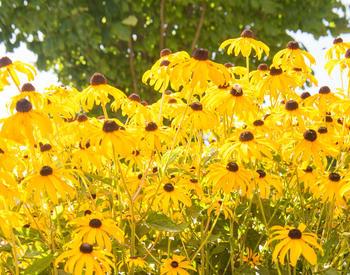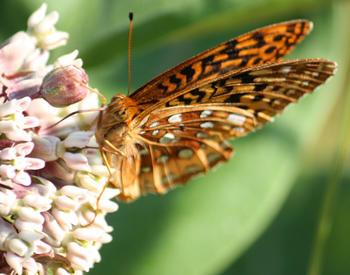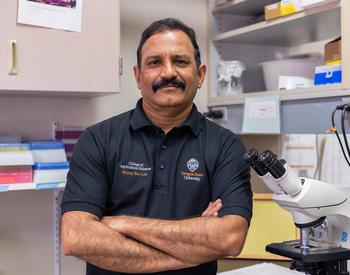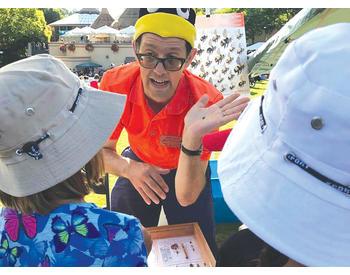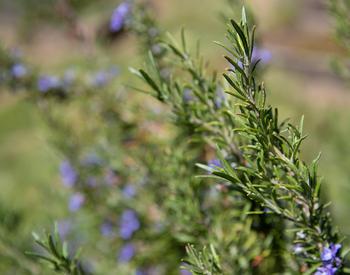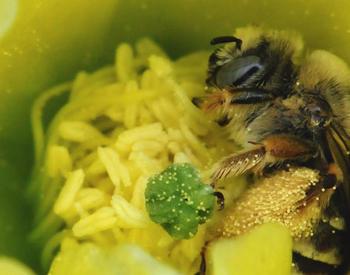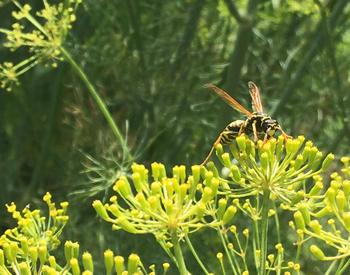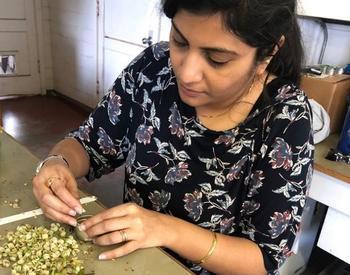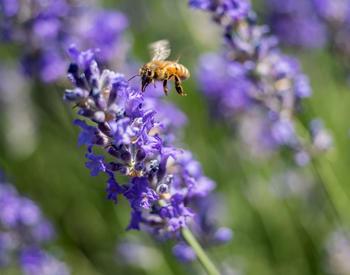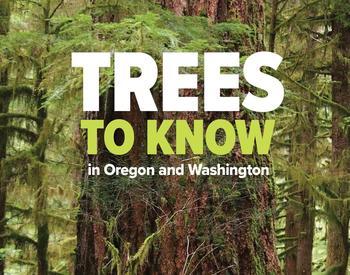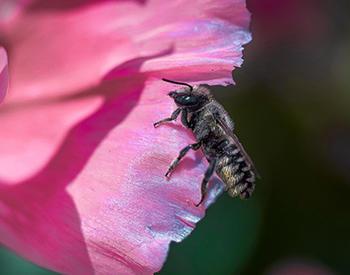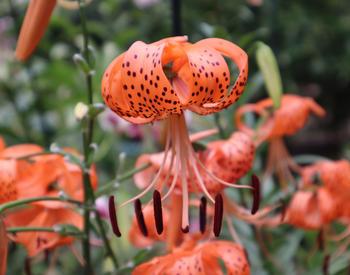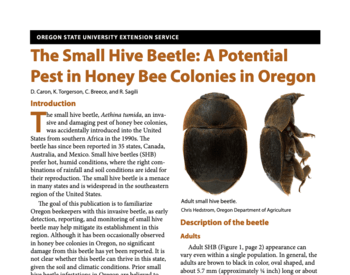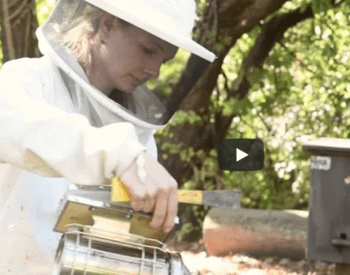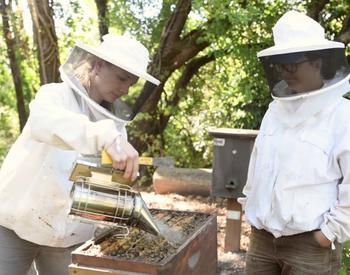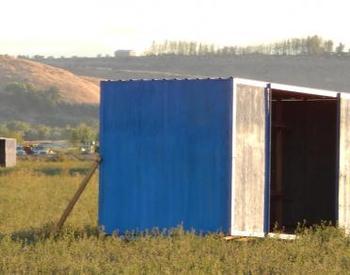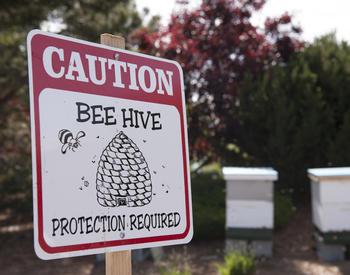Transcript
Speaker 1: From the Oregon State University Extension Service, this is Pollination, a podcast that tells the stories of researchers, land managers, and concerned citizens making bold strides to improve the health of pollinators. I'm your host, Dr. Adoni Melopoulos, assistant professor in pollinator health in the Department of Horticulture. Here on Pollination, we often think about pollinator health in technical terms, you know, whether pollinators are being exposed to pesticides or whether they have sufficient forage to eat or things like are there new parasites in the population?
Well, today's episode takes a different tact. We're going to be talking with Ellie Andrews, who's a PhD student in development, and rural sociology at Cornell University. And she's going to introduce us to the idea that sociology has a big role to play in helping us understand the capacity of something like the beekeeping industry to meet new challenges. So she's going to look at questions, she's going to talk about questions she's been asking about how beekeepers become educated and where experienced beekeepers get the resources and new tools to be able to meet these new challenges. So today on Pollination, we're going to be taking a turn into sociology with Ellie Andrews. Hi, Ellie, and welcome to Pollination.
Hi, thanks for having me. Now, Ellie, you're a sociologist. You're our first sociologist here on Pollination. And you study your focus on pollinator health. Tell us how you became interested in pollinator questions and also maybe build into that answer. What's sociology?
Speaker 2: Yeah, those are both... Well, sociology is a big question, but I'll do my best. I started keeping bees in about 2010. My then-boyfriend, now husband, thought it would be kind of interesting and anachronistic.
And I always like to start that way because I've put a disclaimer out there that we weren't trying to save the bees and that's actually become a big piece of my research and how that motivation kind of guides people's practices. And so there was a chance that came up a couple of years later to do some research on rural resilience. Now, I'm a PhD student in Cornell's Development Sociology Department.
Used to be called Rural Sociology. And so my colleagues and I are looking at processes of social and economic development, mostly international. Those colleagues study the resilience of the Fisher people in Indonesia or sugarcane in Tanzania.
But I wanted to look at domestic questions around rural resilience. And so I wrote up a grant to start looking at beekeeping in Tompkins County here, where Cornell University is located in New York. And then that kind of turned, gosh, four or five years later into my dissertation. So here I am.
Speaker 1: So you started by having you got some bees and you're started keeping bees and you're in this PhD program. Tell us the one thing that I've heard a bit about, but tell us a little bit about what resilience is.
Speaker 2: Well, it's funny you should ask, because, in fact, it's both an object. It's both something that we sort of study and measure, but that's also an object of analysis in and of itself. And same for me with the idea of sustainability. What people actually mean by that is interesting in its own right. And so it becomes kind of its own object.
It can mean a lot of things. And for me, that definition chain shifted as I began my studies again, I was new to the world of bees. I had only really just started paying attention to my own hives. And at first, I thought I was studying the resilience of of sort of bees and bee health, honey, and bee health. As I got into the study, I realized, no, I'm studying the resilience of a kind of beekeeping as a practice, as either an industry or or just a hobby for many people. And what that means is whether it's new people keep taking it up, whether it's not cost-efficient, but sort of, you know, can be economically kind of at least excusable if you're a hobbyist, you're not just hemorrhaging money every year into your hives, which I'm sure people can talk about. I remember going to a beekeeping study.
Speaker 1: Never mean. They said, that's why they keep sending us so many catalogs, all those companies.
Speaker 2: I remember going to a meeting and people were kind of joking about, you know, they had to all drink and eat together and that the club meeting was more of kind of a help, a therapy session. And I'm thinking, oh, this is what I'm talking about, isn't it?
Speaker 1: Well, it's interesting because we often, I think there's a lot of literature there about honeybee colony resilience. But and I think we, you know, we tend to think about pollinator health as being this narrow scientific-technical question. But clearly, there's a way in which many people outside of beekeeping and farming feel invested in the problem of pollinator health. So tell us a little bit more.
You're talking about resilience and how these sociological approaches help us understand these social dimensions of people's investment in pollinators and how beekeeping in general as a social activity can become more robust or less.
Speaker 2: Or less indeed. Yeah, I guess I have sort of two answers there. One is about just the approaches themselves. I think a lot about how we collect social data on these kinds of things. It's easy. Well, it's relatively easy in one sense to collect data about a hive in terms of its nozema counts or it's, you know, whether it's queen right or not.
It can be a lot harder to collect social data about people's motivations about how they group versus whether are they active at home. You know, how do you measure how well somebody knows how to keep bees? Do you measure whether their colonies survived or whether they gave a talk at EIS last year?
I mean, those are both not to say that you given a talk at EIS ever. And so it's, well, so the data I collect is it's mostly through interviews, through observing clubs and how they function in classes around beekeeping. I also stick my head in the archives a fair bit.
I'm interested in some of the historical sweeps of beekeeping, the trend, the popularity of beekeeping over the over the over the century or so. Not much more than that, I suppose.
Speaker 1: Which I can imagine at Cornell is that I imagine the library in Cornell is just probably the best in North America for that kind of literature.
Speaker 2: We certainly like to think so. Oh, yeah. It's, yeah, actually the beekeeping extension program at Cornell is 100 years old this year. Wow. I can talk more about that a little bit later on, but there's some so part of my work again, it's another approach that I use is like I myself hired by extension, I've been working on their master beekeeping program. Now that's a great way to understand the master beekeeping program, but it also poses problems in terms of, you know, social scientific bias or things like that.
But to go back to the kind of broader, I don't think you wanted to just hear about methods, but just to think more broadly about what kind of social sociological questions and studies help us do. It's no prize to anybody who's been keeping bees or, well, I should say it's no surprise to almost anybody who opens the paper that the colonies have been suffering from high losses, honey bee colonies. I mostly just talk about honey bees.
And so there's kind of been there's the phenomenon there of the high losses, but the phenomenon on there is or the secondary phenomenon is that it's being covered by the media at all and that it's lent itself to this or led to a surge in popularity. I was talking to Dewey Karen the other day interviewing with him and he's been doing a survey for ages on people's motivations for keeping bees. And he said, yeah, it was great to talk to him. That kind of historical he's been at Bees for a long time. So he's got some good information. But he said that in roughly 2008 2009, people started answering the survey saying, you know, why are you doing this? That they were doing it to save the bees, not just because of Grandpa or the honey or whatever. And that's interesting.
I mean, in that lens itself, I have sort of a working hypothesis that this might be hard to prove. But I'm wondering about the way the motivations that drive people to start keeping bees kind of in the contemporary age. And I'm wondering whether being motivated by a desire to save the bees actually can carry people through the hard times when they do lose bees year after year after year. A psychological dimension to that that's not exactly sociological. But there's other reasons that I wonder if other motivations help people kind of invest and take the time to learn to keep bees more fully than kind of an impulse responding to the media or the impulse to save the bees.
So I think one of my sort of other sort of corollary hypotheses is that, being a part of a community of beekeepers, both locally, regionally, and more broadly, that actually probably has a greater that helps people stick with it longer and and and kind of join this this this broad sprawling community of practice more effectively than kind of a more isolated impulse to save the bees and save the world with them.
Speaker 1: This is fascinating. These are really fascinating questions. And I think they're really, really needed. I think all of us may have these questions floating in our heads, but we don't have a real clear way of resolving them. How do you as you're sort of thinking about these social forces that are leading to these kinds of changes? What kind of question? Well, you told us a little bit about some of the questions you're asking. But how do you approach these questions as a sociologist? How do you go about resolving these questions? What's what are you up to?
Speaker 2: Yeah, it's a good question. It's again, in my, I always joke that my committee wants to know the answers to. I'm doing my best. I'm, again, I think one of the ways that one of the best ways that I know how to be a sociologist, as I've said, is to dive in totally. So I am not only a keykeeper and not only go to all the meetings and interview people, but also again, I work for the Cornell Extension program. I am the secretary of my local club. I help organize the mentor matches every year. Well, I did I forgot I dropped the ball the first year, which is important data, right? If a highly motivated young figures out how to get the mentor matches set up, then how can anybody else do it in a given year?
I've got several mentor mentees of my own. And so I just, you know, I finally have learned that when I'm working bees with them, I actually do need to suit up because they are a little clumsy around the hives and I am. And so I tend to get, you know, popped in the face a little bit more than I do at home. And so all of these things that are kind of that I couldn't have learned any other way. And I could have talked to people, but just being really deeply, you know, up to my neck and bees and beekeepers beekeeping is how I approach it.
Again, that's tough in terms of separating what's my own journey. For instance, one of my questions that I sort of alluded to is this question about what is sustainable beekeeping. A lot of people kind of hem and haul when I ask. And it seems to be that the more experience you have, the more experienced beekeepers have a different definition of sustainable beekeeping or of sustainable beekeeping than newly minted beekeepers. But then that's hard to disentangle my idea of how that's changed in the seven or eight, seven years or so that I've been doing it, how I can get around that. I'm not sure I think the value of being so deeply embedded is outweighs some of the potential risks of that kind of approach.
Speaker 1: Is this kind of both this immersion, but being able to pose these questions that I guess occurred to some of us, but being able to kind of stand back and sort of see how different people are responding to these kinds of questions and kind of being able to tie them together, that's how a sociologist would approach a question, these kinds of questions.
Speaker 2: Yeah, it's this idea of theory that can sometimes get a bad name. But what theory helps us do is to, facilitates standing back and putting the pieces together. Earlier I mentioned this idea of communities of practice, but that's not really a thing. You might look at a group of people and say, well, that looks like a community of practice, they have, you know, certain rights and rituals, and they're all kind of in this shared endeavor of learning, and there's old timers who are kind of the gatekeepers, and there's new people coming in who, as they learn, and they're also being socialized into new ways of thinking and talking about things. And so theory, so I can now read, you know, other people's work about communities of practice, say in the medical, in medical schools, and that will help me then understand what, what about the B club that I visited last night is kind of either unusual or according to sort of basic human principles of organizing. It can be tough, for me in this research to rate what's just sort of normal human behavior and psychological and personality politics, what is interesting and relevant to the bees and this contemporary age, and what beekeeping clubs are and do and promise. So I have, I can't say I approach it or sort of answer, I muddle through and we all be our best, I suppose.
Speaker 1: You know, a major focus of your work is the ways in which new beekeepers learn about beekeeping, get information about beekeeping. What do you, I know you're just kind of working through this the, at the moment, but what are you, what are you finding? What are, where are new beekeepers learning to become beekeepers?
Speaker 2: Well, yeah, thanks for asking, and thanks also for salting in that caveat. It is an early stage, and so far it's, it borders on the obvious. They learn in lots of places. They're learning, that the internet has a pretty bad reputation among a lot of beekeepers, but I had a great conversation with the gentleman the other day who said, you know, gee, I kind of really look into the internet. My friend is always watching these videos and he has all these great ideas.
And it was helpful to remember, of course, that the internet is a medium and not a, not a source of information, per se. I think that mentoring and the apprentice kind of model of beekeeping in the present day and age is kind of unusual. There are not that many crafts or jobs where jumping in as an apprentice is kind of the, well, one of the most common ways of doing it.
But as I said before, I mentor several beekeepers and these are just hobbyists, but this is true of the commercial scene as well, I think. There's a range of books. Some of my, there's an in this kind of new moment of bee decline and fears over honey bee health. There's been a real flowering of books. And I think many that are critical of mainstream or conventional beekeeping, there's some, I mean, just the titles are kind of funny, the thinking beekeeper, or the, which implies that all the handle of others that are kind of written in this way to either pushing back against certain things or trying to promote new ways of doing things. Top bar hives, of course, have become popular and there are books about that. And of course, the clubs, and that's a big piece of, and the clubs and the classes, the workshops around the state, and those vary enormously.
Some are for profit, some are entirely volunteer, some are kind of a funny hybrid where this guy'll set you up with the hives and the packages and the equipment, but maybe the class is free or whatever it might be there's a whole range of ways. And I'm excited. I just got some survey data. The folks at the Cornell extension, the keeping extension office have been doing a survey of about 60 beekeepers, and the ends are always a little bit smaller than I want them to be, but the 60s are not bad, even that half of them are commercial or sideline or half of them are, are hobbyists. And they, I convinced them to ask a question about how they're, how they're getting educated or how they learn, you know, whether it's self or it's internet, whether it's, forget all the options. But with that data, we'll be able to correlate whether how somebody learns has any bearing on their management styles over winter. Again, with n is or the 60s, 60 is a smallish number, but there should be, there could be some robust correlations. It remains, remains to be seen for now.
Speaker 1: It'd be a very useful finding for extension people like myself to have that kind of insight. That's really, really wonderful work. Yeah.
Speaker 2: And there's a, there's one little column too. I see that some people could fill in others. And one of the things that struck me before and is being confirmed by the survey data is that there's this kind of personality cult that certain people do things, you know, Randy's way or Kirk Webster's way. Or I like to call my question, your, those are the three old, three medium to old guys who kind of stand at the top of those.
Speaker 1: I'm a Webster Way kind of guy. Put my cards on the table.
Speaker 2: I think she's not going to identify myself. I'm not sure which way. Eclectic.
Speaker 1: That's great. One thing that we've, you know, you were talking about earlier that was really for me, one of the first starts that I had for my education was through beekeeping clubs. And we were talking at the break a little bit about how, you know, in sociology, there's been this idea of kind of collapse of civic organizations. You know, there's this one famous piece of work where, you know, the people who bowl increase there, you know, the number of people who belong to a bowling club declined. And I just wanted to ask you a little bit about the health of the bee clubs that you've been looking at my impression, they're growing quite strong.
But what is the role? How important are these bee clubs to educating new beekeepers? And how has the bee club itself changed? Is it the same kind of bee club that I might have experienced in the 90s?
Speaker 2: It's a great question. I love that you went to that work about the bowling league. Because I think that was some really, some really interesting and kind of sociological work that captured a lot of people's imagination and helped explain something that people didn't realize needed explaining, I think. And I think the bee clubs are, they're an enormously interesting and robust kind of phenomenon at this point. Again, it's tough in terms of the methods because part of my sampling is of course going to bee clubs and talking to, you know, getting my interviews with beekeepers who are there and it's much harder to track down those lone wolf beekeepers just by virtue of, you know, they're not being a directory at least not in this state of, or there's no mandatory registration in New York state. And so it's hard to track them down.
But as a phenomenon, unless they are a social group, educational group, they are, they can be a source of support, you know, when a member dies or some of these wives dies, a card might go out or expression is that they from the group, they bring together increasingly, they bring together the young and the old, and increasingly the male and the female, I still often stand out as a younger woman, but not, but not how, not the way I might have as I understand. Oh yeah, for sure. years and I've you know, weaseled my way into the secretary position, although I suppose women being secretary is not terribly, that's right, I have the power of the spreadsheet and all the rest. And I think there's some really, for me in my research, my background before getting into my Ph.D., I feel like I studied very similar questions and looked at very similar sociological phenomena, the way that kind of rural people get together and work out problems. But I did that by looking at land leases around hydraulic fracturing in Pennsylvania. So very different topic, very different kinds of things that are at stake, but nonetheless kind of a lightning rod issue for a lot of people. And one where there was kind of no recourse but to get together face to face and learn and figure things out and learn about geology.
And in Bikini, it's the same thing. You get together, you learn about entomology and biology and phenology, and you kind of muddle along with people in your area. And I think some of the friendships, there's been a lot of, there's a lot of sort of quips that beekeepers, it's kind of odd that beekeepers ever get together because they're kind of odd birds. But of course, on the flip side that bees get together, and therefore beekeepers are social creatures.
Both of those seem to be true at times. But I can speak to the people in my club. It's a wonderful, wonderful group of people and the people who are interested in bees for a range of reasons, share a lot of other interests with me. And so, and so have become my friends and sort of comrades in the last few years.
Speaker 1: Well, and they, I think a lot of these clubs had survived. We have some clubs like here, the Gorge, the Columbia Gorge Club, a brand new club. It's just had a great opportunity to go out there and it's a lot of new energy. But for a lot of older clubs that have been around for a while, this, this, this last decade has really, you know, helped revitalize the club. There's a lot more energy, and a lot more finances in the club. They have running programming that they didn't do before. The same is you're observing similar trends out in New York.
Speaker 2: I am. Yeah, there's, I think the roles of nearly all the clubs I've talked to, the sort of attendance and membership roles have swelled three, fourfold in the last decade or more. Again, I'm a part of that.
So it's hard for me to get that personally, that historical perspective, although I do go into the archives to look at some of, some of, some of those questions from a different perspective. I do know also, well, there's been some controversy around clubs, around turf wars. I won't elaborate far here, but there have been some snafus in New York City about who has the rights to the name New York City Peackeepers Club. And there's been kind of two, two groups going back and forth about that a little bit. I know also in Colorado, there's a, there's a new professional kind of association that formed out of a sense that the older association had changed unrecognizably to the extent that some of the commercial fellows needed or people needed a different forum for them to get together and learn and do what they needed to do.
Speaker 1: So are these, because I do remember in, when I was in Vancouver, there was a similar schism that had opened and it seemed to be over practices. So there was the role of the role of the associate, the role of the clubs. And is this kind of where the tension is arising over approaches to be kept? Is that kind of the content of the turf war? Or they sort of just, you know, what happens in a small community organization?
Speaker 2: Yeah, again, that's the part that's the sociology question is that I'm, I think there are some things that do naturally happen in small community organizations that kind of what I called personality politics earlier. And there's not a lot sociology can do with that just to be like, well, egos exist now and they did.
But sure, I mean, this question of what's often called treatment-free beekeeping has been enormous, I don't even like the word controversial because I'm especially around a lot of sort of contemporary national politics, a sense of sort of like, do we give both sides equal do or not? I'm not sure. I don't think we do.
I think maybe some sides are more wrong than others. But to put it sort of as mildly as I can, there's been a lot of pushback around treatment-free beekeepers. I remember I was at a club or I was at the Western apicultural Society meeting in Missoula a couple of years ago. And there was a wonderful gentleman from Northern Ireland who was giving a talk about queens or something. And somebody in the audience stood up and said, no, sir, with your experience, with the fighting in Northern Ireland, has that helped you mediate between different bee clubs? He had a very gracious response. And again, nobody is being mysteriously murdered over these kind of treatment-free questions.
Except there's a good, I think there's one episode, there was some terrible TV show that didn't happen. But in general, it's this question about what constitutes sustainable beekeeping and how do we measure that. And again, stepping back from kind of beans and outs of whether you scream bottom boards or whether you use, you know, formic versus apolar versus oxalic or just hold your breath and hope they survive, there's no consensus on what sustainability means for bees, for agriculture more broadly, natural resource management, even beyond that. Are we looking at short-term or long-term term and is a beekeeping operation sustainable because it makes a profit every year?
That certainly is a positive indicator, but it's not the only way to understand what that means. And so again, that becomes very much an object of analysis, what these kinds of camps of treatment free and other beekeepers are warring over. There's a book by two sociologists out of New York City who talk about it as being scientific beekeeping versus backward beekeeping. And they don't use the word backward pejoratively, they use it as kind of a self-appointing, that people are self-appointing as kind of backward and trying to go back to the basics. But then it's tangled up to the questions of what's natural, is putting them in a box natural, there's no good place to draw that line, I think.
Speaker 1: Well, it makes me want to end this section on this question because it seems like in some ways we've been through this before. I recall in the early 90s looking for small-scale beekeeping equipment and finding it because it was mothballed in people's basements from the last wave of interest in the 70s, which also seemed to have a similar kind of environmental focus, back to the land movement of the 70s and a real increase in the interest, a real broad increase. You had people participating in beekeeping that wouldn't have done so in the 50s. Do you think that there is a kind of pattern? And if it is, what's driving this?
What's the kind of content of this drive of interest? And you also mentioned going back into the archive, so you've had a glimpse of this in the past. So how do you think about the history of this in terms of what's going on?
Speaker 2: Yeah, I love that you asked this question. And again, hopefully, I'll have a paper about it soon and I'll figure out some way to give it to the general public. But yeah, history repeats itself.
We know that and I can prove it. So a lot of beekeepers know that there was an enormous surge in beekeeping around World War I or during both wars really and had to do with the probability of beekeeping the use of wax and the war effort and honey as a sugar substitute. So basically a lot of new people were getting on board and this is again 19 teens at some point and the number of clubs really takes off at that point because a lot of these people are novices that don't know what they're doing.
There was a real need for education at that time. This is only a few decades after the mainstream adoption of the hives that we all kind of a version of which we use today the Langstraw hives, which itself propelled beekeeping forward in a very as an industry and as a practice, but at the same time kind of unwittingly spread diseases. So at the same time, not I mean, or kind of contributed to practices where people were using comb, reinfecting colonies with fowl brood and fowl brood was a real scourge for decades, depressing honey production across parts of the US.
For a time it was called New York bee disease, much of the chagrin of a lot of New York bee disease and Cornell of course. And so in this moment, it becomes popular, it becomes easier. So the hives as the hives are invented and then disease kind of scours the country then people are back on board because it's this cool thing to do during the war, but I don't know what they're doing and they're spreading diseases again.
And so clubs take off. I haven't looked too far beyond the twenties at this point. I'm not quite sure what I'll do because beekeeping really changes of course the over the century as the interstates are built and the package industry takes off and pollination, well and moving bees north to south and then east to west eventually. Those are all kind of enormous leaps or maybe the leap is kind of a just changes anyway in the industry and what the clubs are doing for people. And that divide between hobbyists and commercials kind of grows and grows and glows as the beekeeping industry becomes more capital intensive, more requires kind of more wherewithal, it's more professionalized and the kind of, I mean we look, you asked about the nineties, we look back at the nineties as being easier in some ways.
People in the nineties look back to the seventies as being easier and on and on and on of course. So I think yeah, this historical perspective is really helpful and in a lot of ways it tells us what we might expect and how some things, what is it, the more things change the more they are. There's this dimension of the specter of climate change and local extinctions especially among pollinators about which I know much less native pollinators and other kinds of bees. And so history of course can't tell us what to expect going forward.
Speaker 1: Yeah, I guess the only thing in my mind is the extent to which this will continue. Like there is a way in which it does seem at this point, our master beekeeping program is running at capacity, and has been running at capacity for a long time. Now there are a lot of people, one thing that I had never seen before is chain stores offering beekeeping supplies.
Like that was an innovation that had taken place and it makes me think that maybe this is here to stay in a way that it didn't go the last time. What do you think, do you have any thoughts on that? You must kind of consider this issue and whether your understanding can help us understand where this is going.
Speaker 2: Boy, it's a good question. I don't know. I think that there is a real opening for or a reopening of understanding the environment, and environmental cycles. Again, beekeeping is really a gateway drug for phrenology and gardening and just even paying attention to the weather every damn day. I mean, I sort of know what it's doing in June so I think about how my bees are faring in a way that the rest of my life in front of the computer or front of the classroom could be very easily dissociated from. So part of me feels like it's this reopening and that there's a real urban interest in it. Part of me is cynical that when the new iPhone comes out, people are still more invested in that, in that dissociation from environmental cycles to the extent that this too might fade. So I don't know. Sociologists really veer between cynicism and optimism on roughly the basis, I think.
Speaker 1: So we've got these three questions and the first one we ask all our guests, is there a book that's really important to the work that you're doing currently or that you want people to know about or is really important bee book when you were learning?
Speaker 2: Yeah, there are probably, well, there's two answers to that. I have lots of twos. Simon is anything that Tom Sealy has ever written. I know I've recommended him before and that's because he is the best bee writer out there. He's brilliant. He makes people like me who aren't really into physical science, like be kind of into it.
You will appreciate the natural forests and the wild hives in new ways. And his writing is beautiful. I think I'm a good writer and he once edited something for us for the Master Beekeeping curriculum and it came back with more writing than not. So that was very humbling. He is such a good writer. Oh, it's just wonderful. It's in the same category for folks who have read, oh, who's that physicist?
My husband will kill me if I can't remember. The very outlandish physicist who played the bongos. Richard Feynman. Richard Feynman, yes. In the category of Richard Feynman. And the other book, if people have a big enough wallet, is the latest edition of The Hive and the Honey Bee.
I mean, it comes in at a thousand pounds. You can just use it as a booster to start, but I mean, a thousand pages. But again, I work in part for Cornell's Master Beekeeping kind of Moon Improve program. And that's our go-to reference on just stupid questions like, you know, what's the research on arthritis and bee stings or what's the, you know, how many compounds have they found in wax and blah, blah. It's just got almost everything you need to know.
Speaker 1: Elliot, the first person to recommend it, it's really astounding that we've gone through so many episodes in so many, it's just such an amazing resource.
Speaker 2: Yeah, it's, yeah, it's again, it's a heavy one and it's not a cheap one. But if you have a local, if you have a library or a university library that can get it for you, it's a great, great resource.
Speaker 1: But it is kind of like every generation, it's their state of the art. It's like a statement on the state of the art of beekeeping for that particular generation of people. I always love looking at past issues of it. It is a really amazing book. I'm so glad you recommended it.
Speaker 2: It's a good one. Yeah. And to those ends, I noticed that my friend and colleague Peter Borscht had written a review of it in one of, I want to say, bee culture probably, and noted that the number of female authors has gone way up in recent, you know, in this last edition, and there's sort of a new and more diverse just group of contributors than there ever has been before.
Speaker 1: Oh, right. That's a really great improvement and sort of hopefully reflects deeper changes that are taking place in the industry. Okay, well, our next question that we ask people is what tool do you use? And I know you're both a beekeeper and a sociologist, so it doesn't necessarily have to be a beekeeping tool. It might be about something that you use for, but what tool would you want to tell our listeners about that it's really invaluable you could not do without?
Speaker 2: For me, it's my notebook. The part of the master beekeeping course that I really took, one part that I really took charge of was this record keeping. I was just in some hives this morning with my mentee, and it was like, we did some mic counts, and it was like, was it two, two, and five, or was it two, five, and two?
And we just couldn't remember after about, you know, 10 minutes how long it had been. And record keeping doesn't have to be onerous. For me, I just scratch out a few things, whether, you know, again, what the mic counts were, whether they're building up, whether they're feeling, whether the bees were frisky that day or not. And that goes a long way when I flip through records of even years past to see how a particular colony is doing or how a location on my property is doing.
If there's one location that doesn't seem to be working out too well, I can find it out that way. It's kind of the same as I know other guests in your show have talked about, you know, the power of observation. But power of observation for me doesn't last very long unless I'm not just a speaker.
Speaker 1: You know, it's the first time for me I've started using a phone app. I use Evernote now to record my information. And I kind of, we should do, there should be an episode. And dear listeners, if there's an episode that you want to hear, you should let us know. We would love to find somebody to answer that.
But we should do an episode on somebody. I remember one guy used to write it in just a great notebook. It was really simple. People have so many great ways of capturing information that works for them. And it's such a great answer. I'm resolved. We need an episode on record making records for your hives.
Speaker 2: Yeah, yeah, I've learned a lot. I don't myself. I have already distanced it once, but I don't myself own a smartphone, but one of my fellow beekeepers does. And she's always snapping photos of, you know, robbing or funky-looking drones with white eyes or whatever we find in there. It's invaluable as a teaching tool and for lots of things. So, and I don't mind getting your phone sticky. That's a good thing to have.
Speaker 1: Okay, well, you're the last question we have for you is, do you have we ask everybody, do you have a favorite bee? And we consider this question quite broad. It can be for does have to be a specific bee species. It can be anything. Sure.
Speaker 2: As a sociologist, and I don't know anything about it. I don't know anything about bees other than aphismalifera, I'm afraid. And mostly I know about homo sapiens is my favorite sort of species. But if I bring it back to bees, there is a wonderful photo of Eleanor Roosevelt all dolled up in bee gear. She was the beekeeper of the pair, not her husband. So I wonder if her bees might be a special favorite sort of my namesake. And then any hive that a first-time person opens up and just gets to feel that buzz and that internal feeling of sort of trepidation and anxiety and awe, I think I outweighed the negative but the positive there. But you know, all those feelings that go through your head the first time you open up a hive, that you know, that bee colony, whichever that is across New York or Oregon.
Speaker 1: I love that. I do, I can barely remember it, but I have a summer student who's working here. We're going to go out and look at the bees after recording here for the first time. So I can remember that feeling. It's just so, it's so amazing. And it becomes so normal after a while. But yeah, that's a great answer. Excellent answer.
Speaker 2: Yeah, you should bring your phone and snap some pictures of her while she's doing that.
Speaker 1: We'll do. Well, it was a real pleasure talking to you. Thank you for taking the time to talk to us about the pollination this week.
Speaker 2: Yeah, it's really my pleasure. I think the podcast is really sharp and everybody should catch up on all the episodes.
Speaker 1: That's a great answer. Thanks so much. You bet. Take care. Thanks so much for listening. Show notes with information discussed in each episode can be found at pollinationpodcast.orgnstate.edu. We'd also love to hear from you and there are several ways to connect. For one, you can visit our website to post an episode-specific comment, suggest a future guest or topic, or ask a question that could be featured in a future episode. You can also email us at pollinationpodcast.organstate .edu. Finally, you can tweet questions or comments or join our Facebook or Instagram communities. Just look us up at OSU Pollinator Health. If you like the show, consider letting iTunes know by leaving us a review or rating.
It makes us more visible, which helps others discover pollination. See you next week.
Ellie Andrews is a PhD student in Development/Rural Sociology at Cornell University. As honey bees across the US face a range of challenges, keeping bees healthy and productive requires ever more skill and investment. Her research seeks to understand the sociological dimensions of these educational imperatives: how are new beekeepers learning to keep bees and how are experienced ones adapting to new challenges?
Ellie is interested in how people evaluate and use different sources of information about beekeeping, how the motivation to “save the bees” informs beekeepers’ management decisions and colony survival, and how individuals’ approach to “sustainable beekeeping” may change as they gain experience and expertise. Her research is based on interviewing beekeepers across New York State and beyond, observing beekeeping clubs and classes (including serving as an officer in her own club), helping put together Cornell’s new and improved Master Beekeeping program, and going into the archives to research the origins of beekeeping extension programs and the professionalization of beekeeping over the last century.
You can Subscribe and Listen to PolliNation on Apple Podcasts.
And be sure to leave us a Rating and Review!
“In 2008, people started answering the survey saying they were keeping bees in order to save them.” – Ellie Andrews
Show Notes:
- How Ellie became interested in the intersection of bee keeping and sociology
- What rural resilience means
- How bee keeping as a social activity can become more robust
- Why more people are doing bee keeping now in order to “save the bees”
- What sustainable bee keeping means for different people
- How people are learning about bee keeping
- The role of bee clubs and how they are doing
- Why lots of bee clubs are experiencing a revitalization
- The enormous surge in bee keeping around WWI and WWII and what that can teach us
“There’s no consensus on what sustainability means for bees, for agriculture more broadly, and natural resource management beyond that.” – Ellie Andrews
